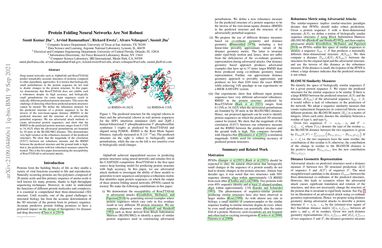Protein Folding Neural Networks Are Not Robust
Deep neural networks such as AlphaFold and RoseTTAFold predict remarkably accurate structures of proteins compared to other algorithmic approaches. It is known that biologically small perturbations in the protein sequence do not lead to drastic changes in the protein structure. In this paper, we demonstrate that RoseTTAFold does not exhibit such a robustness despite its high accuracy, and biologically small perturbations for some input sequences result in radically different predicted protein structures. This raises the challenge of detecting when these predicted protein structures cannot be trusted. We define the robustness measure for the predicted structure of a protein sequence to be the inverse of the root-mean-square distance (RMSD) in the predicted structure and the structure of its adversarially perturbed sequence. We use adversarial attack methods to create adversarial protein sequences, and show that the RMSD in the predicted protein structure ranges from 0.119\r{A} to 34.162\r{A} when the adversarial perturbations are bounded by 20 units in the BLOSUM62 distance. This demonstrates very high variance in the robustness measure of the predicted structures. We show that the magnitude of the correlation (0.917) between our robustness measure and the RMSD between the predicted structure and the ground truth is high, that is, the predictions with low robustness measure cannot be trusted. This is the first paper demonstrating the susceptibility of RoseTTAFold to adversarial attacks.
PDF Abstract
